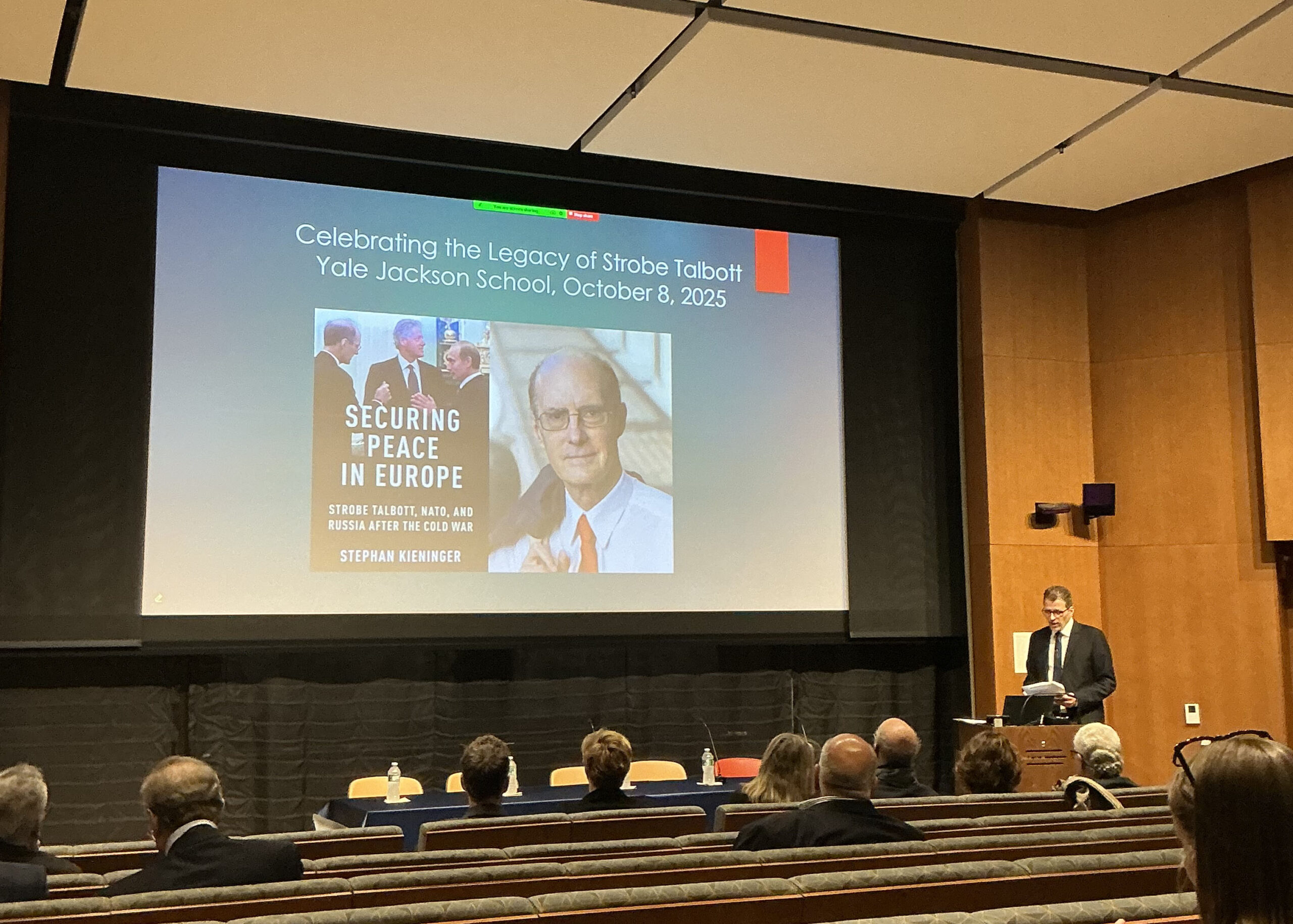Event honors alumnus’ career as diplomat, journalist
Former colleagues of Strobe Talbott ’68 spoke about his legacy of public service alongside a discussion of a new biography about his role reshaping post-Cold War diplomacy.

Melissa Adamantidi, Contributing Photographer
A hybrid event at Yale’s Humanities Quadrangle on Oct. 8 celebrated the legacy of Strobe Talbott ’68 — a journalist, diplomat and longtime public servant.
The event included remarks from Talbott’s former colleagues and introduced a new book on his role in reshaping post–Cold War diplomacy — “Securing Peace in Europe: Strobe Talbott, NATO, and Russia after the Cold War” by Stephan Kieninger.
“Mr. Talbott had been such a consummate Yale man his entire career that it was really appropriate to celebrate his legacy and the publication of the book here at Yale — at his alma mater,” Phil Kaplan, the executive director of the Blue Center for Global Strategic Assessment at the Jackson School of Global Affairs, wrote to the News.
The event was livestreamed and featured a panel of senior U.S. diplomats and policy officials: ambassadors Philip Goldberg, Alexander “Sandy” Vershbow and John Bass, as well as former Deputy Assistant Secretary of State for European Affairs Daniel Hamilton. They all worked with Talbott during the 1990s.
The room was not full, but the audience included figures who shaped Talbott’s career, along with Talbott himself and his wife, Barbara.
Talbott, a Rhodes Scholar and former TIME correspondent, served as the sixth president of the Brookings Institution. His Clinton-era diaries and declassified files — thousands of pages — have been donated to the Beinecke Rare Book and Manuscript Library and are available to researchers.
The talk repeatedly returned to three major moments of Talbott’s career in public service — defusing the 1998 India-Pakistan nuclear crisis, ending the 1999 Kosovo War and building a durable system for European security after the Cold War.
Kieninger — a historian of transatlantic relations and author of the book — opened by expressing gratitude to Talbott before describing how “Securing Peace in Europe” draws on thousands of declassified State Department papers and Talbott’s personal notes.
“You gave me complete freedom in my research,” he said, addressing Talbott from the lectern. “That kind of access is rare — and it allowed me to show how policy and personality came together in a very human way.”
Kieninger projected memos and diary entries that illustrated the texture behind the headlines, including a 1999 note of thanks to colleagues for keeping everyone “on the ball, on the beam, and otherwise not out of our minds” during a stormy week, and a January 1999 recommendation that Antony Blinken, who would later become the secretary of state, accompany him on key trips.
“What I have to keep reminding myself is that I’m not in all of this for careerist motives, I’m needed to do a good job, period,” read one diary entry from March 1993 that Kieninger shared. “I’m determined to succeed or fail trying.”
After the lecture, the discussion turned to a roundtable with Goldberg, Vershbow, Hamilton and Bass — seated from right to left. Goldberg, who served on Talbott’s team during the Balkans conflict, praised Talbott’s efforts for diplomacy while Vershbow spoke on collaboration in the 1997 NATO-Russia Founding Act.
The panel also highlighted Talbott’s Russia portfolio — repeated missions to Moscow during the 1998 financial crisis, early warnings about Vladimir Putin and persistent pressure to keep human rights on the agenda.
“We’d get on a plane and Strobe would get his laptop out and start working on the presentation for how he was going to sell whatever outcomes we had as progress,” Bass said of the eight-weeks-in-10 shuttle during the Kosovo endgame. “We’d work until 10 p.m., sleep, then he’d be in deputies and principals meetings all day Saturday — and we’d leave again Sunday. Week after week the best — example I’ve ever seen of the power of persistence.”
The panelists emphasized that Talbott’s temperament matched his tactics.
Bass described “humility as a really effective instrument of his diplomacy” and a habit of letting “the flag speak for itself.”
Kieninger argued that Talbott’s papers reveal how the same qualities carried across dossiers. In a note to President Bill Clinton, Talbott flagged a forthcoming book on globalization — an example, Kieninger said, of serving as “an early warning system” on issues beyond Russia.
Other records showed how Talbott pushed allies to hold firm on the air campaign while he quietly negotiated terms that would become a U.N. resolution to end the Kosovo war on NATO’s terms.
Vershbow added that Talbott encouraged aides to “come with radical outside-the-box thinking,” while Goldberg remembered memos that invited staff to sharpen drafts and “go find me this quote.”
“He never saw negotiation as weakness,” Goldberg said. “He saw it as the method by which democratic nations solve problems.”
Talbott was the founding director of the Yale Center for the Study of Globalization.







